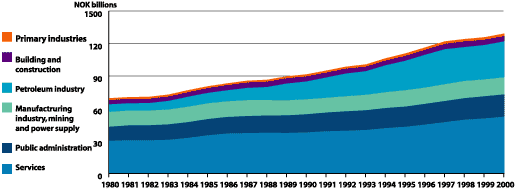No, it really isn't, and your graph shows why. The category "services" is a conglomeration of many industries, such as finance, shipping, health care, etc., rather than being a single industry. You would have a point if one of those industries was larger than the petroleum industry, but all of them put together are not so much bigger. That indicates an economy which has a significant dependence on a single industry--the petroleum industry--as a source of jobs and GDP. The main reason that the recent fall in oil prices has not been catastrophic for them has been their wise policy of investing oil revenue in their sovereign wealth fund and the relatively low cost of their field operations, which means that they're more competitive at low oil prices than, say, many shale plays are.
In any case, a lot of those "services" probably depend on oil and gas for their customers--a bank that mostly works with oil and gas workers, for instance, would show up under "services," but is totally dependent on the oil and gas business for revenue. Something like that happened in Houston in the 1980s--probably on paper (unfortunately I'm having a hard time finding statistics--FRED only seems to have data back to 2001, for instance) we were just as diversified as Norway is, with big health care, construction, real estate, and shipping industries in addition to the 800 pound gorillas (at the time) of our chemical and oil and gas industries. But when the crunch time came and oil prices fell off a cliff, Houston was hit bad. It didn't matter that so much economic activity was nominally in other fields, because those fields were being ultimately driven by our oil and gas industry--those buildings were being built to house oil and gas offices, those hospitals were treating oil and gas workers, that shipping was more oil tankers than anything else. That kind of thing.
When I look around on line, most articles I see on the Norwegian economy do in fact seem to think that it's pretty driven by oil and gas, by the way.
